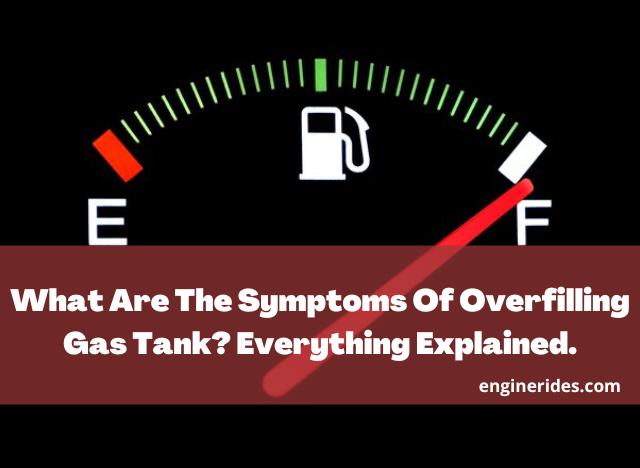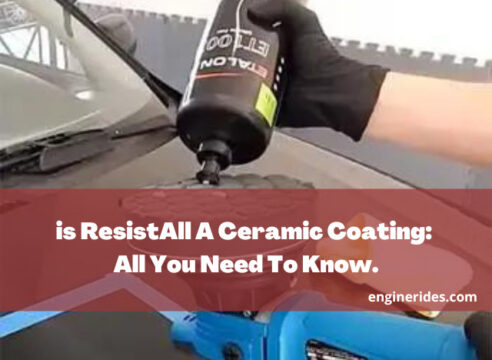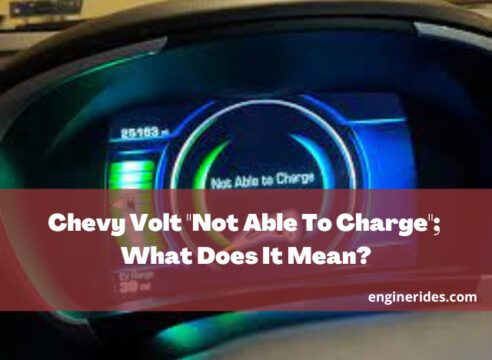What Are The Symptoms Of Overfilling Gas Tank? Everything Explained
Many drivers, in an attempt to maximize their fuel load, unintentionally overfill their tanks. However, this practice can lead to a variety of issues, ranging from minor inconveniences to serious mechanical problems. We’ll discuss the warning signs, potential risks, and how to avoid overfilling your gas tank.
So if you feel like you’ve overfilled the gas tank, or the symptoms make you feel like that, then this guide is a must-read for you. So stick around until the end to find out what you’ve been looking for, and welcome to EngineRides.
Table of Contents
What Are the Immediate Signs of an Overfilled Gas Tank?
The most immediate sign of an overfilled gas tank is fuel spillage. When you overfill the tank, gas can overflow out of the filler neck. This not only creates a mess but also poses a fire hazard. Additionally, you might notice a strong gasoline smell after overfilling, as excess fuel can escape from the tank, especially when the car is in motion or parked on an incline.
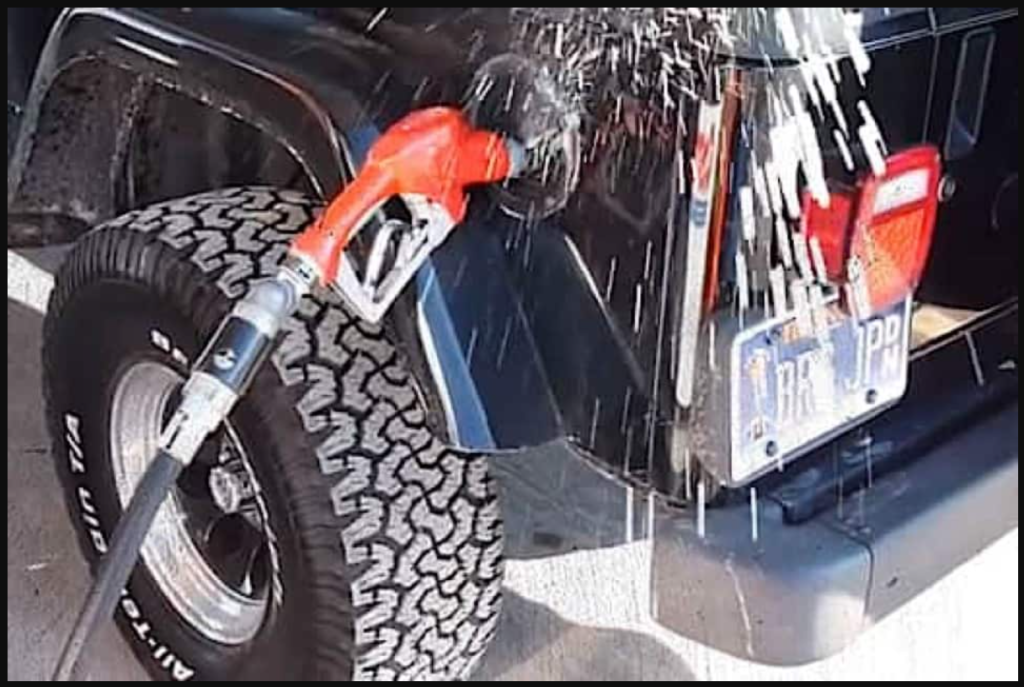
Another sign is trouble starting the engine or a noticeable decrease in engine performance. This can happen if the excess fuel floods the car’s vapor collection system, designed to capture fuel vapors before they can escape into the atmosphere.
How Does Overfilling Affect the Car’s Emission System?
Overfilling your gas tank can have a significant impact on the car’s emission system. Modern vehicles are equipped with an Evaporative Emission Control System (EVAP), which captures fuel vapors from the gas tank and carburetor, preventing them from being released into the atmosphere. When the tank is overfilled, liquid fuel can enter this system, intended only for vapors, and cause it to malfunction.
The symptoms of a compromised EVAP system include the check engine light turning on, a noticeable fuel smell, and decreased fuel efficiency. In severe cases, the liquid fuel in the EVAP system can damage components like the charcoal canister, leading to costly repairs.
Gas Tank Filler Neck Problems, Symptoms And Fixes Explained
ENGINERIDES.COM
Can Overfilling Lead to Fuel System Damage?
Yes, overfilling the gas tank can lead to fuel system damage. When liquid fuel enters parts of the fuel system designed only for vapors, it can cause various issues. One of the most common problems is damage to the fuel pressure regulator and fuel injectors. These components are critical for maintaining the proper fuel-to-air ratio in the engine.
Additionally, the fuel pump, designed to pump vapor-free gasoline, can be damaged by being forced to handle excess fuel. This can result in reduced efficiency and, in some cases, complete failure of the fuel pump.
What Are the Long-Term Risks Associated with Regularly Overfilling the Gas Tank?
Regularly overfilling the gas tank can lead to long-term risks and damage to your vehicle. Consistent overfilling increases the likelihood of serious damage to the EVAP system and other components of the fuel system. This can result in reduced engine performance, increased emissions, and potential failure of emission tests required in many regions.
Moreover, the cumulative effect of these issues can significantly reduce the overall lifespan of your vehicle’s engine and emission systems. Continual exposure to excessive fuel can also degrade rubber hoses and seals within the fuel system, leading to leaks and further complications.
Should car tank be full or empty or mid-filled?
It’s generally safer to keep your car’s gas tank at least partially filled, rather than letting it run empty. A full or adequately filled tank ensures that you won’t unexpectedly run out of fuel, especially in potentially dangerous situations like driving at high speeds on the highway.
If your car runs out of gas, critical systems like power steering and power brakes can shut off, significantly compromising your ability to control the vehicle. This loss of control could lead to dangerous, even fatal, situations. Therefore, maintaining at least a mid-level fuel tank is advisable for safety and to avoid being stranded.
How Can You Prevent Overfilling Your Gas Tank?
Preventing overfilling your gas tank is straightforward. Most importantly, stop filling when the gas pump automatically shuts off. This mechanism is designed to indicate when the tank is full. Avoid the temptation to add more fuel after this point, as this is when overfilling typically occurs.
Regularly checking and maintaining your car’s fuel system can also help prevent issues associated with overfilling. This includes replacing the gas cap if it’s damaged or missing and ensuring that the EVAP system is functioning correctly. Paying attention to your car’s warning signs, like the check engine light, can help catch issues early.
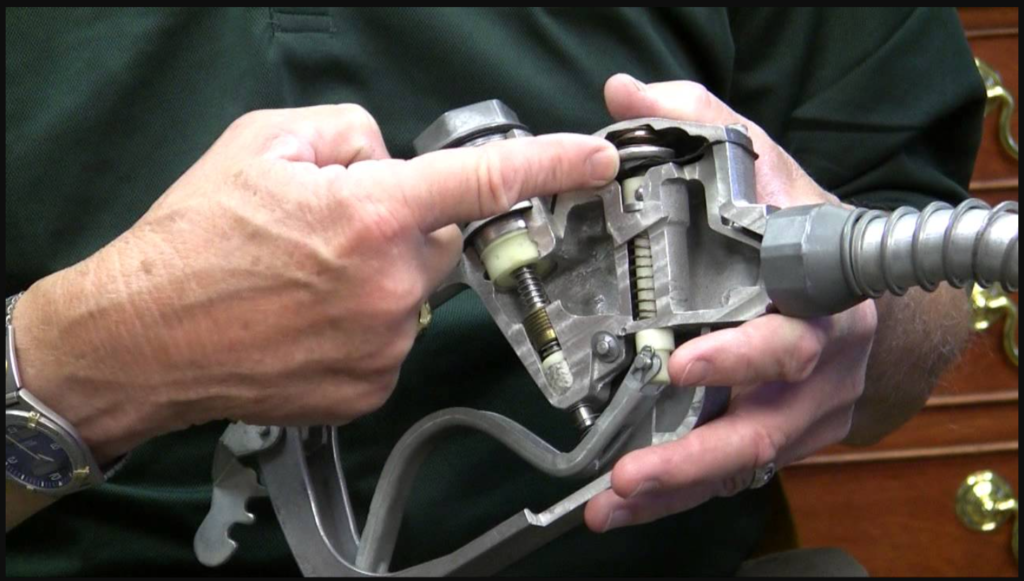
Why does my car feel faster with a full tank?
The sensation of your car feeling faster with a full tank can be attributed to the improved cooling of the fuel pump. A submerged fuel pump, which occurs in a full tank, benefits from better cooling due to the surrounding fuel. This enhanced cooling can lead to more efficient pump performance, possibly making the car feel more responsive or faster.
As the fuel level decreases, the cooling effect diminishes, potentially affecting the pump’s efficiency. If you’re noticing a significant difference, it’s advisable to check with a mechanic to ensure your fuel pump is operating at the correct pressure, as this could be a factor in the perceived change in performance.
Is Your Car Stalls After Getting Gas? Causes And Fixing Explained
ENGINERIDES.COM
Conclusion
Overfilling your gas tank can lead to several problems, affecting both the performance and longevity of your vehicle. By understanding the symptoms and risks associated with overfilling, and taking simple steps to avoid it, you can help maintain your car’s health and efficiency. Always adhere to the gas pump’s automatic shutoff signal to protect your vehicle’s fuel and emission systems.
Some Related FAQs,
1. Does overfilling the gas tank impact fuel efficiency?
Yes, overfilling can lead to decreased fuel efficiency, especially if it damages the EVAP system.
2. How often should I check the EVAP system in my car?
Consult your vehicle’s manual for specific guidelines, but generally, it’s good to have it checked during regular vehicle inspections.
3. Can overfilling the tank cause a gas leak?
While not common, overfilling can contribute to leaks by putting extra pressure on hoses and seals in the fuel system.
4. What should I do if I accidentally overfill my tank?
Drive cautiously and monitor your car for any immediate symptoms. Consider having it inspected by a professional if you notice issues.
5. Can all types of vehicles be affected by overfilling the gas tank?
Yes, overfilling can cause issues in any vehicle with a traditional gasoline engine.

